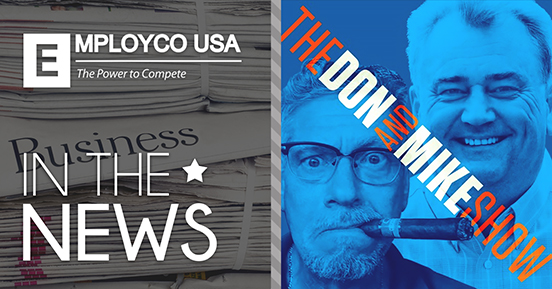Employment trends expert explains how to manage the tricky topic of raises
 A record number of people are leaving their jobs because they are not happy with their current pay. In fact, nearly half of the employees who recently quit their jobs did so because they wanted a raise.
A record number of people are leaving their jobs because they are not happy with their current pay. In fact, nearly half of the employees who recently quit their jobs did so because they wanted a raise.
“Employees are being advised that the job market is improving, which makes them believe that this a good time to ask the boss for a raise,” says Rob Wilson, President of Employco USA and employment trends expert. “However, not every employer agrees.”
Wilson goes on to point that salary increase levels are uncharacteristically low given how good the unemployment numbers have been.
“We expect national salary levels to increase 3.1% in 2019,” says the employment trends expert. “The vast majority of our clients are expecting to increase their 2019 salary budgets by that same target.”
So, given that raises will be a hot-button topic that many employers will face in the coming months, how should they approach this topic with their workers?
“We recommend that employers review not only employees’ performance to set 2019 salary levels, but also review that position’s pay against internal and external salary data to ensure their top performers are compensated appropriately,” says Wilson.
The employment trends expert also says privacy can be a good idea when it comes to a person’s pay.
“In very few organizations is it a good idea to openly communicate salary ranges for each position to the entire employee population. We’ve seen this go very poorly in companies without strong total compensation philosophies,” says Wilson.
For more on this topic, please contact Rob Wilson at rwilson@thewilsoncompanies.com.

 Research has shown that the American commute keeps getting longer and longer, with the average worker
Research has shown that the American commute keeps getting longer and longer, with the average worker  The Senate could vote this week on a bill which would take apart a good deal of President Obama’s Affordable Care Act, including a key piece of legislation which required employers to offer health insurance to all employees who work 30 hours or more per week.
The Senate could vote this week on a bill which would take apart a good deal of President Obama’s Affordable Care Act, including a key piece of legislation which required employers to offer health insurance to all employees who work 30 hours or more per week. As the economy strengthens and jobs’ numbers improve, employees now have more options and bargaining power than in recent memory. However,
As the economy strengthens and jobs’ numbers improve, employees now have more options and bargaining power than in recent memory. However,  A
A  Blue Cross Blue Shield is proposing premium cuts in many states across America for 2019, with some states seeing as much as a 5% decrease or more. However, there could be more to this story than meets the eye.
Blue Cross Blue Shield is proposing premium cuts in many states across America for 2019, with some states seeing as much as a 5% decrease or more. However, there could be more to this story than meets the eye. According to the most recent data, premium healthcare plans for individuals in 2019 will increase by 15 percent in many states across America. As the Affordable Care Act continues to be in flux, employers are very concerned about how they can help keep healthcare costs down.
According to the most recent data, premium healthcare plans for individuals in 2019 will increase by 15 percent in many states across America. As the Affordable Care Act continues to be in flux, employers are very concerned about how they can help keep healthcare costs down.